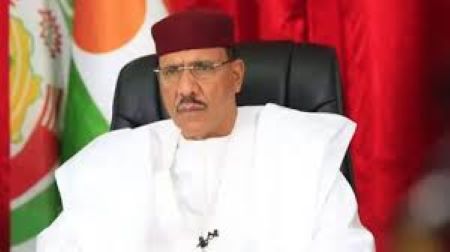The Niger junta has launched a preliminary investigation into ousted President Mohamed Bazoum on charges of high treason. Bazoum, who was overthrown in a military coup over a year ago, remains in detention as the junta alleges that he conspired with foreign powers and maintained links with terrorist organizations active in the Sahel region.
These accusations suggest that Bazoum’s actions were not only politically motivated but also potentially compromised national security.
The investigation further alleges that Bazoum, during his presidency, made efforts to collaborate with external forces to destabilize Niger. This includes claims of an attempted escape from detention, which the junta views as part of a broader strategy to undermine the government and possibly restore his regime through external intervention.
Additionally, Captain Ibrahim Traore, the leader of the junta in Burkina Faso, has also leveled serious allegations against Bazoum.
ALSO READ Niger junta releases wife, son of ousted president Bazoum from house arrest
ALSO READ “Niger Junta says ECOWAS is influenced by foreign powers, regrets Nigeria’s role
According to Traore, Bazoum requested the Burkinabe authorities to halt military operations against certain terrorist groups and even provide them with rear bases for their activities.
This accusation, if substantiated, could deepen suspicions about Bazoum’s ties to extremist elements in the region, further complicating his political and legal standing.
These developments have heightened tensions within Niger and the broader Sahel, a region already grappling with instability due to the growing influence of terrorist networks like al-Qaeda and ISIS affiliates.
Bazoum’s international relations during his presidency, especially with France and Western allies, have come under scrutiny as the junta continues to emphasize foreign interference as a key issue.
While Bazoum has garnered support from international bodies, including ECOWAS, which condemned the coup, the junta’s accusations of high treason and links to terrorism could complicate diplomatic efforts to resolve Niger’s political crisis.
As investigations proceed, the future of both Bazoum and Niger remains uncertain, with potential repercussions for regional security and governance in the Sahel.


